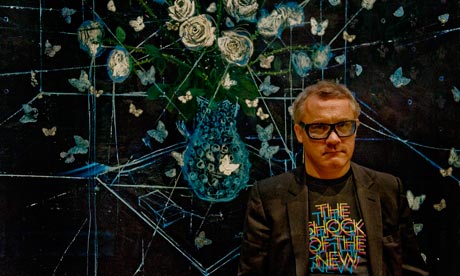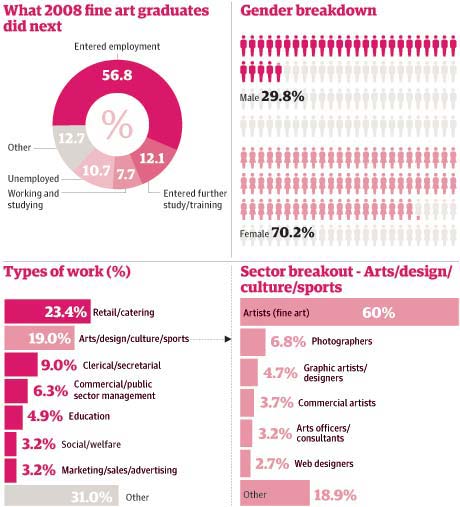The Guardian,

Fine art graduate Damien Hirst. Photograph: Sarah Lee for the Guardian
It's often said that one must suffer for one's art and, for aspiring artists, a spell of pennilessness after graduating has historically been de rigueur. This is as true today as ever, shown not only by the fact that 10.7% of 2008 fine art graduates were unemployed after leaving university (see graphic), but also by the high proportion listing catering or retail work as their primary occupation.
On the bright side, in between the waiting shifts you'll have plenty of time to polish your artistic skills and cultivate a brooding sense of existential angst. Just remember to take the long view; while arts funding will be scarce in the coming years, recessions have historically allowed creativity to flourish, as fine art graduates of the late 80s and early 90s, such as Damien Hirst (pictured) showed.
As our data also shows, fine art graduates splinter off into a broad range of career directions, from teaching to management to media and advertising.
Art is often a solitary pursuit so you should also have a good idea of how to motivate yourself and research ideas, materials and equipment.
The creative arts sector has more to offer though and roles in art galleries and museums, theatre, film and crafts would be suited to fine art graduates.
Holbrough points out that in business, the artistic flair of fine art graduates is also recognised in roles where the visual image is paramount, such as advertising and marketing, exhibition design, publishing and illustrating.
"Teaching, art therapy and working for community arts projects offer more socially and educationally focused careers, plus arts administration and management would give an alternative perspective to the arts," she says.
 Data supplied by the Higher Education Careers Services Unit and Graduate Prospects
Data supplied by the Higher Education Careers Services Unit and Graduate Prospects
On the bright side, in between the waiting shifts you'll have plenty of time to polish your artistic skills and cultivate a brooding sense of existential angst. Just remember to take the long view; while arts funding will be scarce in the coming years, recessions have historically allowed creativity to flourish, as fine art graduates of the late 80s and early 90s, such as Damien Hirst (pictured) showed.
As our data also shows, fine art graduates splinter off into a broad range of career directions, from teaching to management to media and advertising.
What skills have you gained?
First and foremost you should have begun accumulating a hefty portfolio of work with which to showcase your technical and creative talents. The theoretical side of your degree should enable you to put your work into proper context, explaining your influences, the reasoning behind your choice of subjects and why you used certain materials.Art is often a solitary pursuit so you should also have a good idea of how to motivate yourself and research ideas, materials and equipment.
What jobs can you do?
"Fine art graduates often specialise in a particular form of art such as painting, drawing, installations, sculpture or printmaking but finding regular work or a permanent job as an artist is not easy and for some, self-employment, short-term residencies or commissions are the main career opportunities," says Margaret Holbrough, careers adviser at Graduate Prospects. It can take time to establish yourself as an artist while building up a credible portfolio.The creative arts sector has more to offer though and roles in art galleries and museums, theatre, film and crafts would be suited to fine art graduates.
Holbrough points out that in business, the artistic flair of fine art graduates is also recognised in roles where the visual image is paramount, such as advertising and marketing, exhibition design, publishing and illustrating.
"Teaching, art therapy and working for community arts projects offer more socially and educationally focused careers, plus arts administration and management would give an alternative perspective to the arts," she says.
Postgraduate study?
More than 12% of 2008 fine art graduates went on to further study, many taking master's courses to specialise in particular areas of art. Shorter courses specialising in certain related aptitudes, such as smithing, are also popular. A significant proportion go on to take a Postgraduate Certificate of Education, qualifying them to teach art in schools. Data supplied by the Higher Education Careers Services Unit and Graduate Prospects
Data supplied by the Higher Education Careers Services Unit and Graduate Prospects 
No comments:
Post a Comment